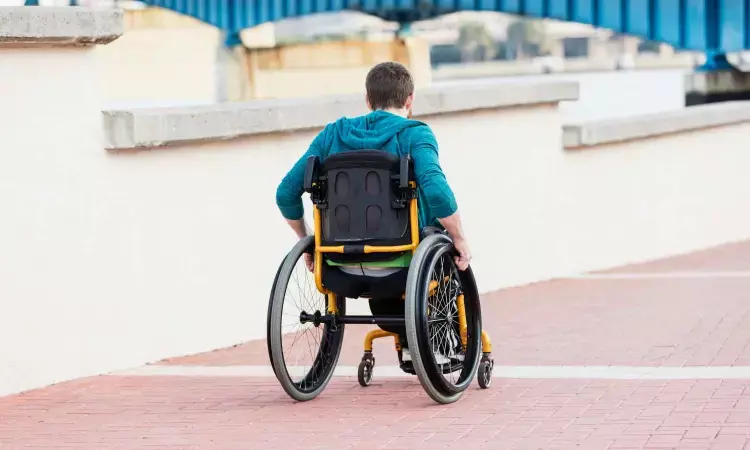- Home
- Medical news & Guidelines
- Anesthesiology
- Cardiology and CTVS
- Critical Care
- Dentistry
- Dermatology
- Diabetes and Endocrinology
- ENT
- Gastroenterology
- Medicine
- Nephrology
- Neurology
- Obstretics-Gynaecology
- Oncology
- Ophthalmology
- Orthopaedics
- Pediatrics-Neonatology
- Psychiatry
- Pulmonology
- Radiology
- Surgery
- Urology
- Laboratory Medicine
- Diet
- Nursing
- Paramedical
- Physiotherapy
- Health news
- Fact Check
- Bone Health Fact Check
- Brain Health Fact Check
- Cancer Related Fact Check
- Child Care Fact Check
- Dental and oral health fact check
- Diabetes and metabolic health fact check
- Diet and Nutrition Fact Check
- Eye and ENT Care Fact Check
- Fitness fact check
- Gut health fact check
- Heart health fact check
- Kidney health fact check
- Medical education fact check
- Men's health fact check
- Respiratory fact check
- Skin and hair care fact check
- Vaccine and Immunization fact check
- Women's health fact check
- AYUSH
- State News
- Andaman and Nicobar Islands
- Andhra Pradesh
- Arunachal Pradesh
- Assam
- Bihar
- Chandigarh
- Chattisgarh
- Dadra and Nagar Haveli
- Daman and Diu
- Delhi
- Goa
- Gujarat
- Haryana
- Himachal Pradesh
- Jammu & Kashmir
- Jharkhand
- Karnataka
- Kerala
- Ladakh
- Lakshadweep
- Madhya Pradesh
- Maharashtra
- Manipur
- Meghalaya
- Mizoram
- Nagaland
- Odisha
- Puducherry
- Punjab
- Rajasthan
- Sikkim
- Tamil Nadu
- Telangana
- Tripura
- Uttar Pradesh
- Uttrakhand
- West Bengal
- Medical Education
- Industry
Lower limb problems in boys with cerebral palsy tied to higher probability of cryptorchidism treatment

USA: A study of 44,561 male patients with cerebral palsy found a link between lower extremity spasticity and a higher likelihood of surgery for cryptorchidism.
Cerebral Palsy has been linked to a condition called cryptorchidism in males-when, one or both of the testicles are not present in the scrotum.
In addition to finding an overall association between lower extremity spasticity and cryptorchidism treatment, investigators found that boys with more severe spasticity were especially likely to have had the surgery.
The study, published in Developmental Medicine & Child Neurology, included 44,561 male patients with cerebral palsy in the Pediatric Health Information System, a comparative administrative database involving multiple US children’s hospitals.
The study revealed the following findings:
- 1.6% of patients underwent orchidopexy at a median age of 7.7 years.
- 16.0% of patients had lower extremity contractures, 1.1% had only upper extremity contractures, and 82.8% had no documented extremity contractures.
- The presence of lower extremity contracture was significantly associated with a higher rate of orchidopexy for cryptorchidism compared to the absence of any extremity contracture (OR=1.33); importantly, upper extremity contracture was not associated with orchidopexy risk (OR=0.507).
- Of the 7,134 patients with lower extremity contractures, the need for intervention for extremity spasticity was significantly associated with a higher rate of orchidopexy (injection procedures: (OR=2.47); limb surgical procedure: (OR=2.60).
- Among patients with lower extremity contractures, the proximity of contracture to the groin was significantly associated with an increased risk of orchidopexy (proximal contracture vs distal contracture OR=2.52).
“While we are unable to determine the reason for the association using this database definitively, the associative effect is strong, and it may be related to affected muscles in the groin or the muscles attached to the testicle itself,” said corresponding author Eric Bortnick, MD, of Boston Children’s Hospital. “Ultimately, it is important for these boys, where another medical complexity is present, to continue to perform the testicle exam at check-ups to confirm that cryptorchidism isn’t present.”
Reference:
Eric M. Bortnick, Tanya Logvinenko, HH Scott Wang, David J. Fogelman, Benjamin J. Shore, Caleb P. Nelson, Michael P. Kurtz.
Dr Kamal Kant Kohli-MBBS, DTCD- a chest specialist with more than 30 years of practice and a flair for writing clinical articles, Dr Kamal Kant Kohli joined Medical Dialogues as a Chief Editor of Medical News. Besides writing articles, as an editor, he proofreads and verifies all the medical content published on Medical Dialogues including those coming from journals, studies,medical conferences,guidelines etc. Email: drkohli@medicaldialogues.in. Contact no. 011-43720751


